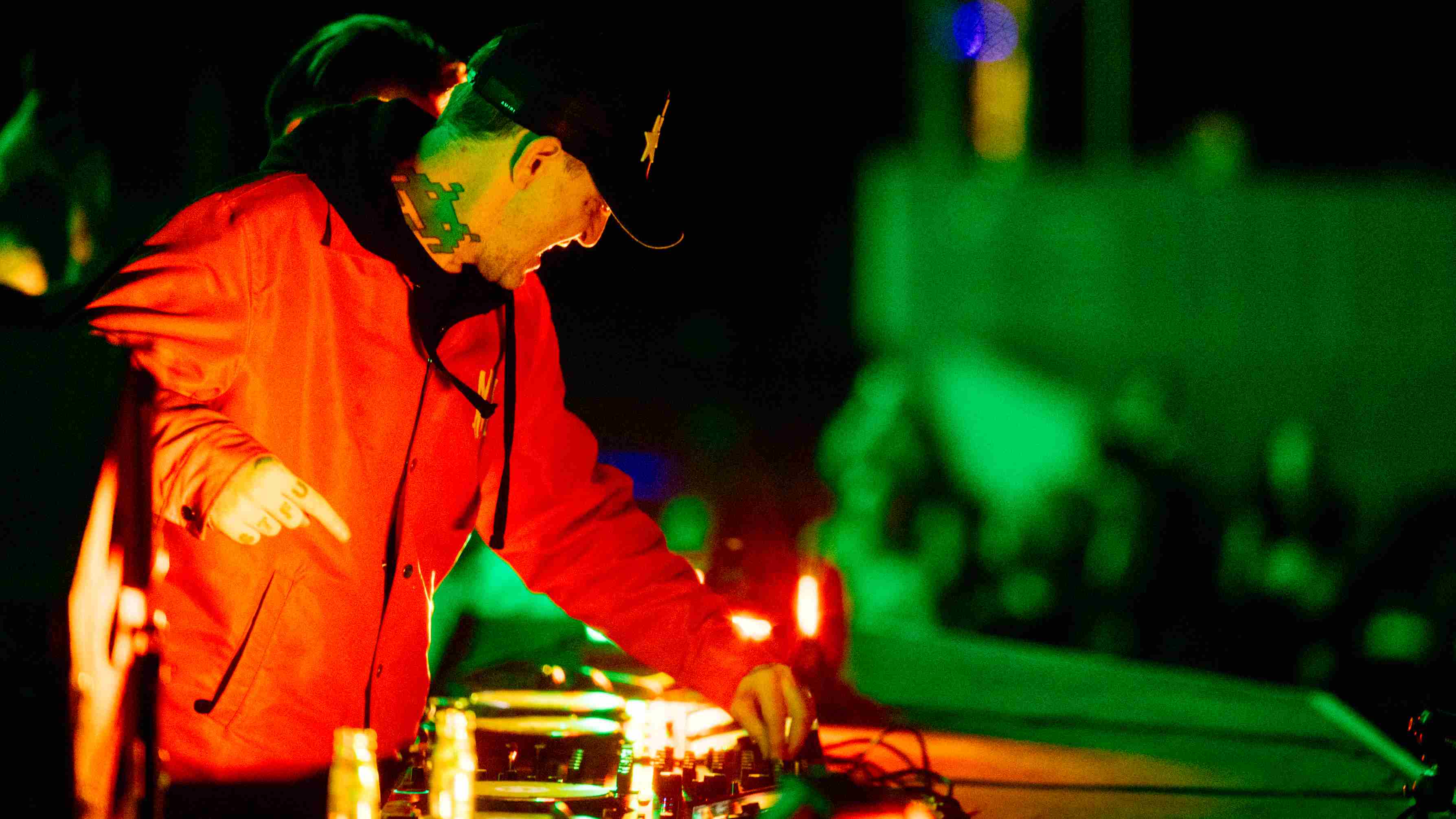Deftones' Abe Cunningham talks Gore and bandmate beefs
Plus, why he's not a metal drummer.
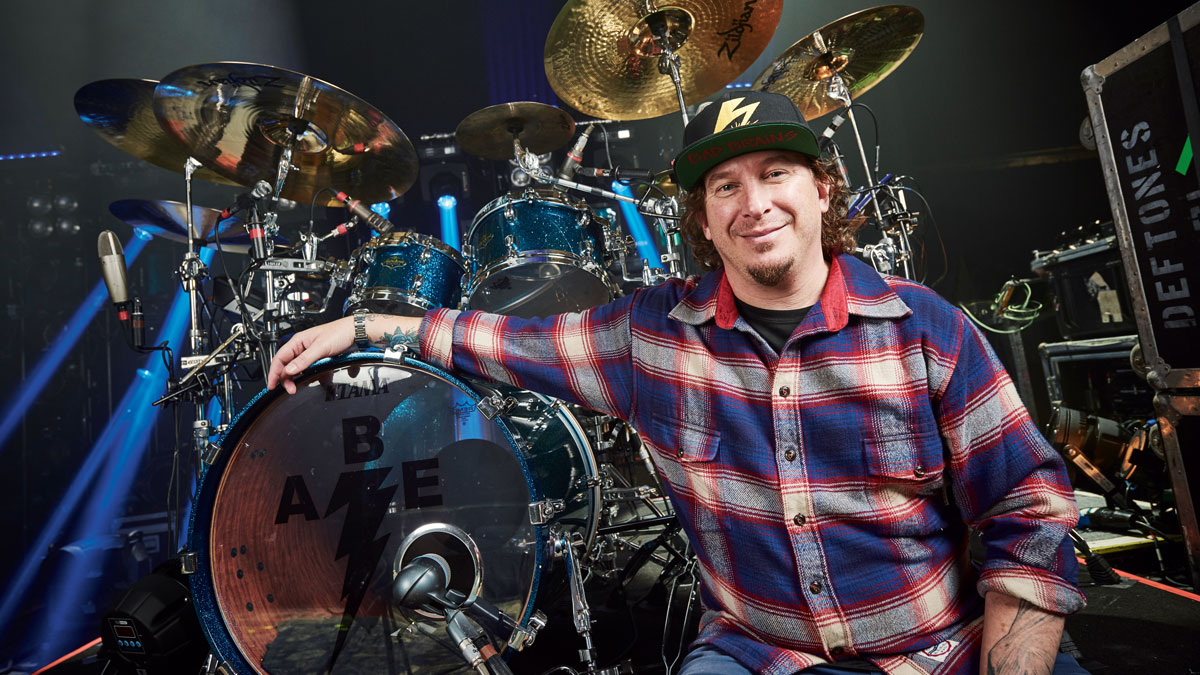
Abe Cunningham talks Gore, bandmate beefs and why he isn't a metal drumm
Abe Cunningham is the last member of Deftones to arrive in London for their sold-out show in Wembley Arena.
It’s not that he’s slacking, but he’s flown in direct from his son’s high school graduation. It’s a reminder of the band’s longevity and their continued success 21 years on from the release of their 1995 debut Adrenaline.
It hasn’t all been plain sailing and Deftones’ turbulent history is well documented – notably the accident that left original bassist Chi Cheng in a coma for four years before he passed away in 2013. But Cunningham is a fast-talking bundle of energy and his passion for his band is undiminished. Throughout the interview he refers to his bandmates as family.
We’re playing pretty damn well these days.
They’re out promoting new album Gore, a record that reached Number Two on the US Billboard chart and Number Five in the UK. Cunningham takes nothing for granted but is clearly pumped to still be able to pack out arenas and kick ass on stage. “We’re playing pretty damn well these days,” he says, “and that’s fuel right there.”
Gore reunites the band with Matt Hyde from the Koi No Yokan album, why did you want to work with him again?
“We were very comfortable with him, we had a great time making Koi No Yokan and he’s out of his mind, but in a great way. The vibe is probably the most important thing really. When you’re trying to put something down to tape or hard drive that will be there forever, you want the best environment and the best people around. He’s just a mad scientist. But it’s hugely important for everyone to get along, that’s the foundation of it all.”
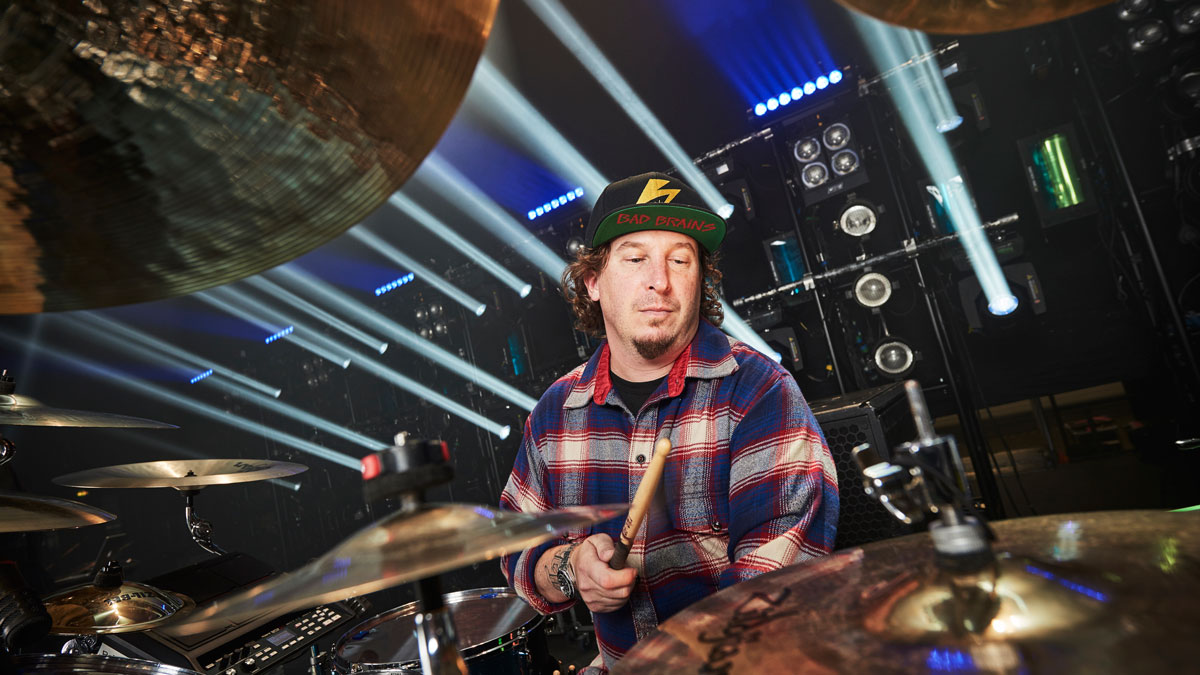
"I'm not really a metal drummer..."
When did you start the writing process for Gore?
“These were all written pretty much in the same way that we always do. We get together in this little room and just throw stuff at the wall and see what sticks. We’re a band, man, and no one really has anything fully written. It’s just the mood and the overall feel so we get in and bash it out.
“But we’re also brothers as well and it’s not always easy, especially after all these years. We’ve got better at being more efficient with our time and not wasting it because we’ve spent so many years just wasting time. There is a bit more urgency now. A lot of that came after Chi’s accident and then eventually his passing really made us have a better respect for time.
Chi’s accident and then eventually his passing really made us have a better respect for time.
“Getting back to your question, this time it was us in a small room just doing our thing. This time we did it a bit differently. Rather than, ‘Here’s two months to write a record, go write,’ we broke it up into maybe two weeks of writing, then we would go book a week of shows, then go home for a week or two. It took longer overall but it freed us up to be normal and still earn a living and still have fun writing and being in a band together. It’s really about balance for us at this point. You get in that grind, that’s very typical of the record industry, you can get caught up in this write-record-tour cycle. We did it for years. We’ve made it through to the other side.”
Is there a consideration with a new album that you have to give fans what they want from Deftones, while still progressing musically?
“We’ve always tried to do something a bit different each time. Even our first record, it was a pretty straightforward album but you could hear elements of things we wanted to try sonically and layers and soundscapes, there were little tinges of that. The second album was a bit more and then on White Pony we perfectly melded everything. There are some really heavy bashing songs but then it’s really beautiful making the perfect flow and mix.
“In my eyes that was the first time we achieved that. And it’s so important that we still make records, we try to make full albums. The intent is to have the person put it on and not take it off until it’s done. We put a lot of conscious effort into making things flow with the interludes and how it’s sequenced. I learned long ago that you can’t make everyone happy but you can certainly try.
“Quite frankly, we make music for us. We have to enjoy it. I’m thankful that people have followed us and let us go on our weird ways. I know people have been upset by it too but it’s got to be fun for us. We’ve got to keep it fresh.”
How does that come into play for your drumming?
“I don’t know. Stephen, our guitarist, and I have tremendous beef. Back in the day he and I would get together, jam everything out and get things going. Of course it takes the whole band to make the song but he and I would always, to the wee hours of the night, totally focus on getting stuff together.
Stephen, our guitarist, and I have tremendous beef.
“I’m not really a metal drummer. I love metal, but I’m not really a metal drummer. I don’t really possess the skills to do a lot of the stuff that he wants which has become our beef over the years. We’re brothers, I love him more than anything, but I don’t want to play that style.
“That’s what makes us us, too. He’s a rhythm player and he’s gotten more into syncopated matched-up double bass stuff and I don’t want to do that. Personally I don’t really possess those skills. But we’re all such different people, we’re tight as can be, but we all like different things.”
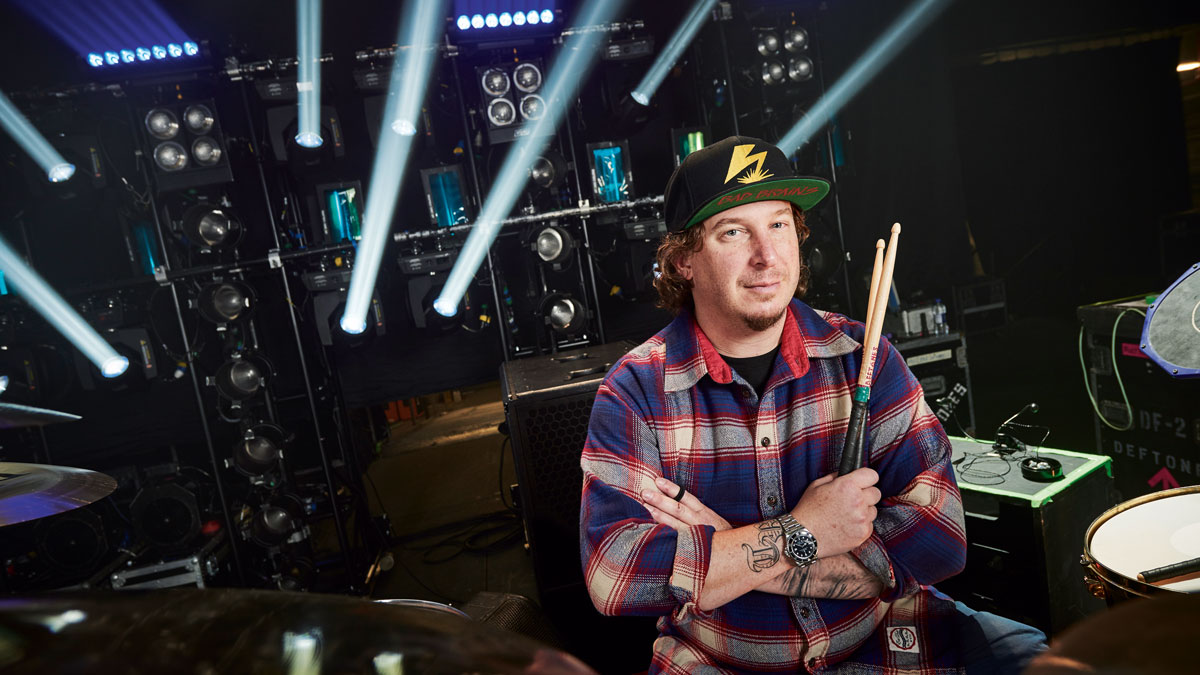
"Fighting for sonic real estate in this band is extremely difficult."
How do you approach your drum sound in the studio? Do you rely on the engineer and producer?
“It goes back to the question earlier, we’re working with these people, we’re co-producing, no one is going to tell us what to do but we’re open to ideas. We work with people that we’re able to get along with and feed off but as far as the drums, the set-up I use is pretty much exactly what I use live.
“We’ll pop different kick drums and different snares in for fun and switch things out but it’s not that scientific. If something sounds good, then roll with it. I have some Tama Bell Brasses that I’ve had forever.
“There was a little 12"x5" Brady. I have a couple of Brady snares I’ve gotten from going down to Australia. I got this one in ’96. That was my secret weapon, it’s on a couple of songs but I always come back to the Bell Brasses. I love those drums, you can do so much with them.”
I’ve learned to lighten up a lot over the years. I used to be very uptight about things, I think drummers are that way a lot.
Is it a challenge to maintain the dynamics in your drumming when playing an arena?
“Over the years we’ve come from the small clubs, we’ve played arenas, the big festivals, theatres, all these different things, and it’s all an adjustment as you go. The first arena tour we went on was with Ozzy Osbourne. Randy Castillo was playing drums for him at the time and I was a lot younger and way more busy.
“I’ve learned now that the rooms eat up all that stuff. He would always say, ‘Try to make it to the back. Hit it like you mean it, don’t try to do stuff that’s fancy because it’s going to get lost in that space.’ I took that to heart. Really, you should just be playing your ass off and having fun.
“I’ve learned to lighten up a lot over the years. I used to be very uptight about things, I think drummers are that way a lot. Something can be off, your show is ruined. But I look around at my bandmates a lot. If we’re doing a lot of smiling, I know Sergio’s good, Stephen is hiding in his hair, but we have a lot of interaction in our band and we like to make sure everyone is all right. If that’s going on up here, chances are it will be pretty good out there.”
Given Stephen uses extended range guitars and Sergio is playing a six-string bass, where do you fit in sonically?
“Fighting for sonic real estate in this band is extremely difficult. Drummers are like, ‘Make it sound like John Bonham,’ but Jimmy Page played pretty much a clean tone, slightly distorted. There’s plenty of real estate.
“Here I am trying to fit in and every record has different tunings so they have to carry all of these guitars. It went from six strings to seven, now he’s got eight. It’s really difficult. He’s a sonic real estate hog and it’s gotten worse.
“There are some samples on things to support the mixing but we’re trying not to rely on those. On this record there are some really nice moments when it’s a bit lighter and the drums are able to really come through.
“One of the neatest things has been working with Terry Date over the years because Terry is not only a father, a brother, an uncle, he’s family and we love him so much, but he’s so meticulous. When it comes to tracking, it’s nothing fancy. He never uses a bottom snare mic but he’s able to pull out insane ghost notes and a crazy crisp snare bottom. He uses one mic on the kick, an ATM25, super minimal, but when it comes to mixing, he’ll bury his head in the channels and carve it out.”
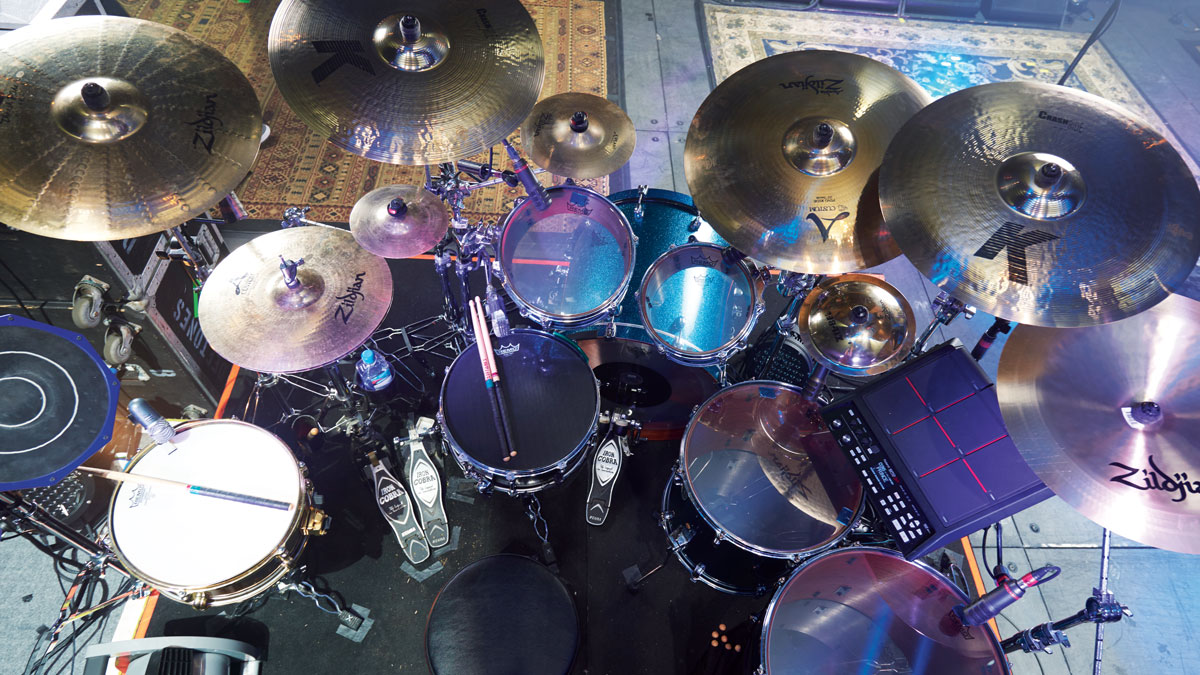
Abe's gear
Many metal drummers lock in with the rhythm guitar pattern, but what’s your personal approach?
“Honestly, probably not knowing what the hell to do. I swear to God. All of us being self-taught and figuring out where to fit in and where not to fit in. You hear the old blues cats say, ‘Less is more.’ You fill space with your notes and when there’s a time and place to go wild maybe you can throw a little fill in.
“I think it’s not knowing what do but having done it with these guys for so long is where we’re at. We’re just who we are. It’s definitely always been a metal-based sound from our very core, it still is to this day. It’s always a heavy, distorted guitar-driven sound but we’re just trying to do things that make us happy.”
Do you think you play the old material differently now?
“This is another beef I have with Stephen. He is of the frame of mind that everything must be exactly like the album, which I can agree with to a certain degree, but I grew up on people jamming. You should be able to stretch out.
“I want to keep the songs true as possible but I do stuff to drive him crazy, I’ll play something just to p**s him off because I can, we’re brothers. He’ll do it to me too. He’ll speed something up. He’s got a very steady right hand but he’ll tweak the tempo out and I know he’s doing it. Nothing is to a click, it’s all us, for better or worse.”
Abe’s Gear
Drums
Tama Starclassic in Bubinga:
22"x20" bass drum, 14"x6" SLP maple snare, 12"x9" & 10"x8" toms, 16"x16" & 18"x16" floor toms, 14"x6" Abe Cunningham Signature brass snare.
Cymbals
15" A Mastersound hi-hats, 19" A Heavy crash, 8" A splash, 21" K crash-ride, 10" K splash, 22" A Custom Ping ride, 21" K crash-ride, 19" K china.
Plus
Remo heads, Coated Controlled Sound Black Dot with Clear Ambassador on SLP snare, Black Max with Ambassador Clear on Signature snare, Clear Emperors with Clear Ambassadors on toms, Powerstroke 3 Black Dot on the bass drum; Synesthesia Mandala pads (x2); Roland SPD-SX; Pro-Mark Signature sticks; Tama Star hardware, Iron Cobra double pedal, Speed Cobra hi-hat stand.
Zak Starkey is back in The Who. “I take responsibility for some of the confusion… Zak made a few mistakes and he has apologised”, says Pete Townshend
“I oversaw every element - not just the music and the lyrics and the melodies and the production, but also the merch and the fan clubs and everything”: Mike Portnoy talks about his years away from Dream Theater
Zak Starkey is back in The Who. “I take responsibility for some of the confusion… Zak made a few mistakes and he has apologised”, says Pete Townshend
“I oversaw every element - not just the music and the lyrics and the melodies and the production, but also the merch and the fan clubs and everything”: Mike Portnoy talks about his years away from Dream Theater









